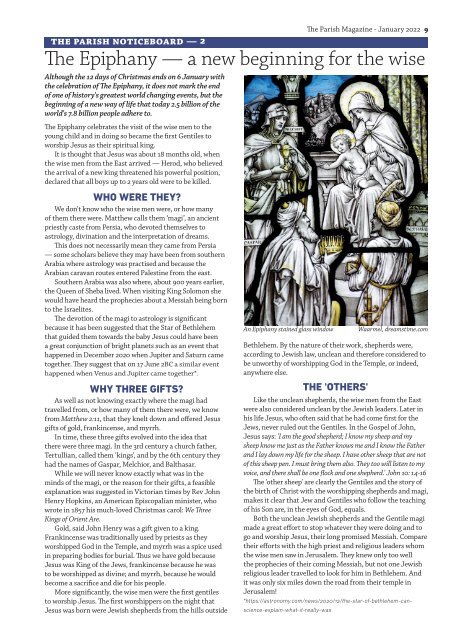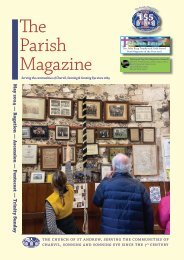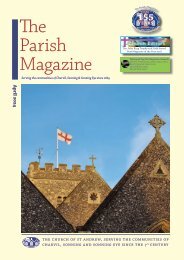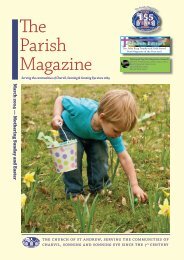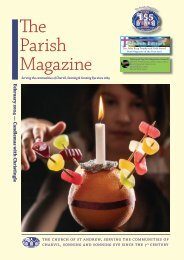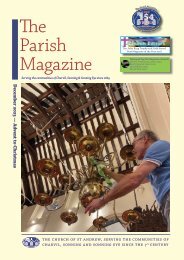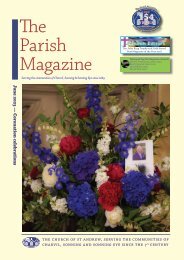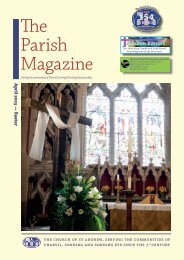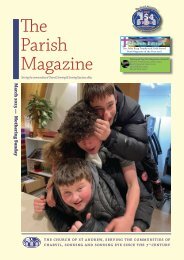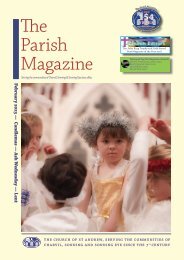The Parish Magazine January 2022
Serving the communities of Charvil, Sonning and Sonning Eye since 1869
Serving the communities of Charvil, Sonning and Sonning Eye since 1869
Create successful ePaper yourself
Turn your PDF publications into a flip-book with our unique Google optimized e-Paper software.
the parish noticeboard — 2<br />
Although the 12 days of Christmas ends on 6 <strong>January</strong> with<br />
the celebration of <strong>The</strong> Epiphany, it does not mark the end<br />
of one of history's greatest world changing events, but the<br />
beginning of a new way of life that today 2.5 billion of the<br />
world's 7.8 billion people adhere to.<br />
<strong>The</strong> Epiphany celebrates the visit of the wise men to the<br />
young child and in doing so became the first Gentiles to<br />
worship Jesus as their spiritual king.<br />
It is thought that Jesus was about 18 months old, when<br />
the wise men from the East arrived — Herod, who believed<br />
the arrival of a new king threatened his powerful position,<br />
declared that all boys up to 2 years old were to be killed.<br />
We don't know who the wise men were, or how many<br />
of them there were. Matthew calls them ‘magi’, an ancient<br />
priestly caste from Persia, who devoted themselves to<br />
astrology, divination and the interpretation of dreams.<br />
This does not necessarily mean they came from Persia<br />
— some scholars believe they may have been from southern<br />
Arabia where astrology was practised and because the<br />
Arabian caravan routes entered Palestine from the east.<br />
Southern Arabia was also where, about 900 years earlier,<br />
the Queen of Sheba lived. When visiting King Solomon she<br />
would have heard the prophecies about a Messiah being born<br />
to the Israelites.<br />
<strong>The</strong> devotion of the magi to astrology is significant<br />
because it has been suggested that the Star of Bethlehem<br />
that guided them towards the baby Jesus could have been<br />
a great conjunction of bright planets such as an event that<br />
happened in December 2020 when Jupiter and Saturn came<br />
together. <strong>The</strong>y suggest that on 17 June 2BC a similar event<br />
happened when Venus and Jupiter came together*.<br />
As well as not knowing exactly where the magi had<br />
travelled from, or how many of them there were, we know<br />
from Matthew 2:11, that they knelt down and offered Jesus<br />
gifts of gold, frankincense, and myrrh.<br />
In time, these three gifts evolved into the idea that<br />
there were three magi. In the 3rd century a church father,<br />
Tertullian, called them 'kings', and by the 6th century they<br />
had the names of Gaspar, Melchior, and Balthasar.<br />
While we will never know exactly what was in the<br />
minds of the magi, or the reason for their gifts, a feasible<br />
explanation was suggested in Victorian times by Rev John<br />
Henry Hopkins, an American Episcopalian minister, who<br />
wrote in 1857 his much-loved Christmas carol: We Three<br />
Kings of Orient Are.<br />
Gold, said John Henry was a gift given to a king.<br />
Frankincense was traditionally used by priests as they<br />
worshipped God in the Temple, and myrrh was a spice used<br />
in preparing bodies for burial. Thus we have gold because<br />
Jesus was King of the Jews, frankincense because he was<br />
to be worshipped as divine; and myrrh, because he would<br />
become a sacrifice and die for his people.<br />
More significantly, the wise men were the first gentiles<br />
to worship Jesus. <strong>The</strong> first worshippers on the night that<br />
Jesus was born were Jewish shepherds from the hills outside<br />
<strong>The</strong> <strong>Parish</strong> <strong>Magazine</strong> - <strong>January</strong> <strong>2022</strong> 9<br />
<strong>The</strong> Epiphany — a new beginning for the wise<br />
WHO WERE THEY?<br />
WHY THREE GIFTS?<br />
An Epiphany stained glass window<br />
Bethlehem. By the nature of their work, shepherds were,<br />
according to Jewish law, unclean and therefore considered to<br />
be unworthy of worshipping God in the Temple, or indeed,<br />
anywhere else.<br />
Like the unclean shepherds, the wise men from the East<br />
were also considered unclean by the Jewish leaders. Later in<br />
his life Jesus, who often said that he had come first for the<br />
Jews, never ruled out the Gentiles. In the Gospel of John,<br />
Jesus says: 'I am the good shepherd; I know my sheep and my<br />
sheep know me just as the Father knows me and I know the Father<br />
and I lay down my life for the sheep. I have other sheep that are not<br />
of this sheep pen. I must bring them also. <strong>The</strong>y too will listen to my<br />
voice, and there shall be one flock and one shepherd.' John 10: 14-16<br />
<strong>The</strong> 'other sheep' are clearly the Gentiles and the story of<br />
the birth of Christ with the worshipping shepherds and magi,<br />
makes it clear that Jew and Gentiles who follow the teaching<br />
of his Son are, in the eyes of God, equals.<br />
Both the unclean Jewish shepherds and the Gentile magi<br />
made a great effort to stop whatever they were doing and to<br />
go and worship Jesus, their long promised Messiah. Compare<br />
their efforts with the high priest and religious leaders whom<br />
the wise men saw in Jerusalem. <strong>The</strong>y knew only too well<br />
the prophecies of their coming Messiah, but not one Jewish<br />
religious leader travelled to look for him in Bethlehem. And<br />
it was only six miles down the road from their temple in<br />
Jerusalem!<br />
*https://astronomy.com/news/2020/12/the-star-of-bethlehem-canscience-explain-what-it-really-was<br />
THE 'OTHERS'<br />
Waarmel, dreamstime.com


